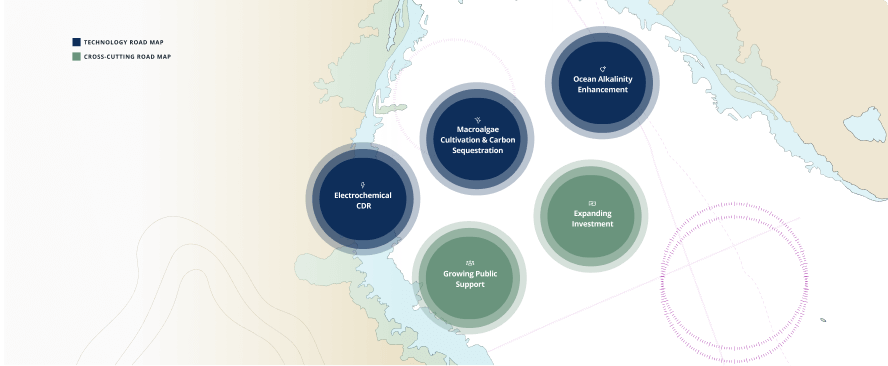
Remove
Advancing Ocean-Based Pathways for Cleaning Up Carbon Pollution
The biggest threat to the long-term health of the ocean comes from the build-up of greenhouse gas pollution in the atmosphere, which drives excess heat and acidity into the ocean.
We can address this only by reducing overall greenhouse gas concentrations in the biosphere, which necessarily includes both reducing emissions and cleaning up billions of tons of the carbon dioxide pollution already in the air and water.
There are many potentially viable ways to clean up carbon pollution—including pathways that harness the natural power of the ocean. Ocean Visions is working to advance the responsible research and development of all possible pathways to determine which ocean-based climate solutions might be safe, equitable, and viable.
Our initiatives include:
Accelerating Innovation

Innovation Road Maps
In order to advance our collective development of viable possibilities, Ocean Visions, working with experts from around the globe, developed a series of road maps that assess the current stage of various technologies and identify obstacles to their development and a suite of “first-order priorities” to advance development. We continue to update and build out these road maps, and to catalyze intellectual and financial resources towards a number of identified priorities.

Launchpad
As part of our continued efforts to support innovation and testing of possible solutions, Ocean Visions provides tailored expert support to selected innovators through the Ocean Visions Launchpad by building customized advisory teams, selected from our Network where possible. These expert teams help companies test and validate their technologies and business models in order to improve their chances of success.
Supporting Critical Research & Development

Creating a Framework to Guide Research on Seaweed-Based Carbon Dioxide Removal
Growing and sinking seaweed in the deep ocean has received widespread attention as a potential strategy to sequester carbon dioxide, but there is a lack of information needed to assess the technology’s effectiveness and environmental impacts. Together with Monterey Bay Aquarium Research Institute, Ocean Visions released a report outlining the comprehensive research framework needed to determine the efficacy and impacts of cultivating and sinking seaweed to sequester carbon. We are now working to bring the report to the attention of governments and to identify sources of support that can fund needed research.

Advancing Ocean Alkalinity Science & Technology Through Grantmaking
Ocean Visions partnered with Additional Ventures and a consortium of philanthropic funders to launch the $20M Ocean Alkalinity Enhancement (OAE) Engineering Award and the OAE Research Award. The awards are part of a larger effort to accelerate the understanding of OAE as a potential method for large-scale CDR. Ocean Visions designed and managed the Request for Proposal process and facilitated expert technical evaluation of submitted proposals, drawing on expertise amongst our Network members and others.
Building Supportive Frameworks To Advance Ocean-Based Climate Solutions

Enabling Governance Frameworks
The development of effective governance frameworks is a key need in advancing responsible research. With funding support from Ocean Visions, The Sabin Center for Climate Change Law at Columbia University developed model federal legislation to advance safe and responsible ocean-based carbon dioxide removal research in U.S. waters.

Shifting the Narrative
One of the critical obstacles to moving solutions-oriented research and testing forward quickly is a lack of support among key influencers. Ocean Visions conducted social-change public opinion research to better understand how opinion leaders are forming their beliefs around the field of ocean-based carbon dioxide removal. In addition to the audience research, Ocean Visions is increasing its visibility at international gatherings, from the UN Ocean Conference, to COP27, and many stops in between to ensure ocean-based climate solutions is getting full consideration.


